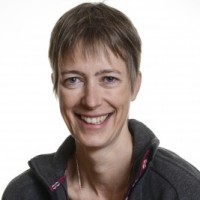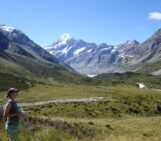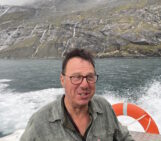– written by Micha Dietze, Annegret Larsen (both GM Early Career Representatives), and Anouk Beniest (EGU TS Early Career Representative) –
An interview with the Susanne Buiter, the current chair of the EGU Programme Committee
Susanne Buiter is senior scientist and team leader at the Solid Earth Geology Team at the Geological Survey of Norway. She is also the chair of the EGU Programme Committee. This means that she leads the coordination of the scientific programme of the annual General Assembly. She assists the Division Presidents and Programme Group chairs when they build the session programme of their divisions, helps find a place for new initiatives and tries to solve issues that may arise. This also includes short courses, townhall and splinter meetings, great debates, events on arts and other events. The programme group also initiates discussions on how to include interdisciplinary or transdisciplinary science and how to accommodate the growth of the General Assembly.
Susanne, you are perfect example of a scientist bridging scientific work with scientific management. What brought you to this and how do you manage keeping the balance?

Susanne Buiter senior scientist and team leader at the Solid Earth Geology Team at the Geological Survey of Norway.
I would not call it perfect! And I find it not so easy to keep a balance. I am very fortunate that my employer, the Geological Survey of Norway, recognises the importance of organisations like EGU for the geoscience community in Europe. That means that I can partly use working hours for EGU activities and that is a great help. For me, EGU fulfils an important task in bringing people together for networking, starting new projects, discuss new ideas and I would like to contribute to making that possible. I guess one thing led to the other, but what is important for me is that all activities are truly fun and rewarding.
It seems you have filled almost all the different possible jobs within the EGU: giving talks, discussing posters, judging presentations, convening sessions, coordinating ECS activities like short courses, acting as Programme Group member and leader, serving as TS Division President, and now working as Programme
Committee Chair. Could you describe what the main goals of the EGU are for you, and what brought you to become such an active member of the EGU community?
I see the role of EGU as serving the geoscience community through enabling networking, discussions and information sharing. Our General Assembly is very important for this and also our journals. I love the outreach and education that EGU does, through the GIFT programme and attempts to interact with politics and funding agencies. By the way, the short courses are for and by all participants, including the ECS, but not only!
Could you shed some light on the structure of this big ship called EGU in a few sentences?
What characterises EGU is that the union is by the community and for the community. EGU has a small office in Munich that oversees the day-to-day operations and coordinates our media activities (www.egu.eu). They are also EGUs long-term memory. We have 22 divisions from Atmosphere Sciences AS to Tectonics and Structural Geology TS. The division presidents are usually also chair of their associated Programme Group, with the same abbreviations AS, BG, CL etc that you see in our programme at the General Assembly in Vienna. They schedule their parts of the conference programme. For this, programme group chairs rely on the work of conveners (you!) to propose and organise sessions. Division presidents are also member of EGU’s council, together with EGU’s executives. Here decisions are taken on budgets, committee work, new executive editors of journals etc. EGU has among others committees for awards, education, outreach, publications and topical events (https://www.egu.eu/structure/committees/). Copernicus is hired by EGU for organisation of the General Assembly and publication of the 17 journals (https://www.egu.eu/publications/open-access-journals/). All EGU journals are open access. Sorry, that was rather more than a few sentences…
How flexible – in your experience – is the EGU administration and organization on a scale of 1-10?
A 9! I would have like to say a 10, but improvements are always possible. The EGU office, executives, divisions and committees put a lot of effort in coordinating all activities. We actually rely on flexibility as EGU is bottom-up. This is also how new initiatives find a place. For example, EGU2018 will have a cartoonist-in-residence and a poet-in-residence, a new activity I am very excited about and that was proposed by participants.
Regarding the ECS, which role do you feel should they play at EGU level? What is running very well and what would you like to change? Where do you think are fields where you see opportunities to become more active?
About half of participants to our General Assembly identify as ECS according to the survey from 2017 and abstract submission statistics for 2018. So they should play an important role! Not only in the General Assembly, but also in our committees. The ECS representatives are important for their feedback to council, making the ECS opinions heard, and starting new activities, such as the networking reception, many short courses, and the ECS lounge. What I would like to change? More ECS session conveners please! I would really like to encourage ECS to submit session proposals during our call-for-sessions in Summer. And please consider to submit your abstract with oral preference, so conveners can schedule ECS talks.
What is most important for ECS to know about the EGU structure?
Know your ECS representative. At the General Assembly, come to the ECS forum on Thursday at lunch time and the ECS corner at the icebreaker. Connect with scientists in your division(s) by attending the division meeting.
From your perspective, what can we do to motivate more ECS to actively shape “their” EGU?
It is building on what you already do: share information on EGU, the divisions, that we are bottom-up and therefore rely on suggestions by community members. Encourage ECS to suggest sessions, volunteer as committee member when there are vacancies (these are advertised on www.egu.eu and through social media), and organise activities at, before and after the General Assembly. Encourage ECS to use the conference in Vienna to network with all participants, not only through ECS channels, and find new opportunities that way. My observation is that many experienced scientists love to discuss with ECS and perhaps even start new collaborations.
Which ways and approaches do you see to better connect ECS within and between Programme Groups?
I find especially connections *between* Programme Groups very interesting, not only for ECS. EGU is growing to a size that it has become more difficult to find time to look outside your own bubble. We have been investigating ways to make our programme more interdisciplinary (https://meetingorganizer.copernicus.org/EGU2018/sessionprogramme/IE) and perhaps in the future also transdisciplinary, to try to create new approaches. That said, I am happy to see at the ice-breaker and networking reception that many ECS identify with more than one division! It is important to cross borders, that is where a lot of exciting research happens.
The mentoring programme is a rather new feature for many divisions. Could you give some feedback on how it went last year? Will it be a permanent item during the EGU General Assembly?
We organised the mentoring programme in 2017 as a pilot, which we on purpose kept somewhat low profile to generate feedback and develop our tools. We see the programme as a networking opportunity for both first-time and experienced attendees. Feedback was very positive, so we are rolling out in full this year. We offer matching, two meeting opportunities at the General Assembly and some guidance (https://www.egu.eu/outreach/mentoring/).
The EGU General Assembly can be overwhelming at first. What would you advice young (and not so young) researchers to do to have a successful meeting?
Attend short course SC2.1 on how to navigate the EGU (Monday at 08:30), read the first-timer’s guide to the General Assembly (https://blogs.egu.eu/geolog/2017/11/29/a-first-timers-guide-to-the-2018-general-assembly/), and make sure you are on the mailing list for your division ECS representatives if they have one. Some divisions have an ECS evening event, do attend! Consider taking part in the mentoring programme of course. And prepare a personal programme before heading to Vienna. Not to follow it in detail, but at least to know where to go for talks, PICO, short courses, posters, and events. I would definitely use the General Assembly to talk to other participants, this is a great chance to expand your network.
Time and space are precious during the EGU General Assembly. There are over 10.000 contributions, many aiming at a talk, but ending up as posters, the session rooms are often overcrowded, the lunch break brings a rush and long queues. Is there any way the Union Council considers to improve certain bottle necks or are we already at the maximum of optimizing some of the conference logistics?
In 2017, we had ca. 17,400 presentations and 14,500 participants. We rented a new hall on the forecourt of the conference centre, which we will also have in 2018. This increased the conference space, taking pressure off the rooms and surely reduced queues. Copernicus and EGU work continuously on optimising the scheduling. We also started a broader discussion on future formats of the General Assembly. I would like to take this opportunity to encourage trying a PICO presentation or convening a PICO session. I have run some poster-only sessions the last years, which have been great fun as we had so much better time for discussions.
Many ECS approach their representatives because they are worried or disappointed to see their initiatives for scientific session proposals not succeeding. Instead they find year after year the same names behind established and crowded sessions. Do you have any advice how to deal with this or do you think this is not really an issue?
I am aware that this may unfortunately play for some sessions, but overall I think we cater well to new initiatives. My advice to Programme Group chairs is to encourage ECS conveners for new sessions and also to include ECS as part of long-running sessions that should rotate, and renew, conveners each year. Our General Assembly offers place for sessions on the basics and fields that require long-term developments, and at the same time also on new, emerging topics. Sometimes these sessions on upcoming topics may be small in number of submissions, but large in attendance. The best I can say to anyone is to discuss concerns or feedback regarding convening with the division president and the ECS division representative.
With the growing amount of members and participants (almost) every year, how do you see the EGU’s future both as a community and as one of the most important events?
EGU is an important voice of the Earth and space science community in Europe. I think the union should continue to do what it is good at: providing a platform for networking, discussions on new and old fun topics, and information sharing. I would like EGU to stay flexible and cater to new formats in its journals and at its General Assembly, the latter also in light of discussions on CO2 costs of meetings.
Thank you Susanne!
Could I emphasize again that EGU is bottom-up and depends on input from our communities? So please contact your ECS representative, the division president or me (programme.committee@egu.eu) with ideas and feedback!
Some more information online here:
https://meetings.copernicus.org/egu2018/information/programme_committee
http://www.geodynamics.no/buiter/
– written by Micha Dietze, Annegret Larsen (both GM Early Career Representatives), and Anouk Beniest (EGU TS Early Career Representative) –



![20 Years of GM [Part 1]: Looking Back with Geomorphology Division Presidents!](https://blogs.egu.eu/divisions/gm/files/2025/04/4-161x141.png)
